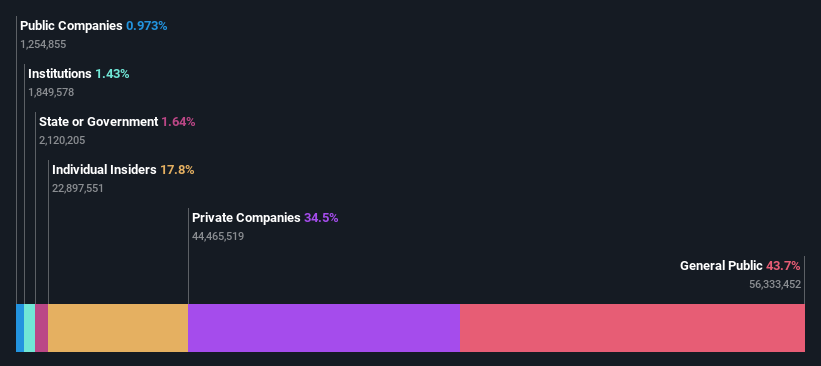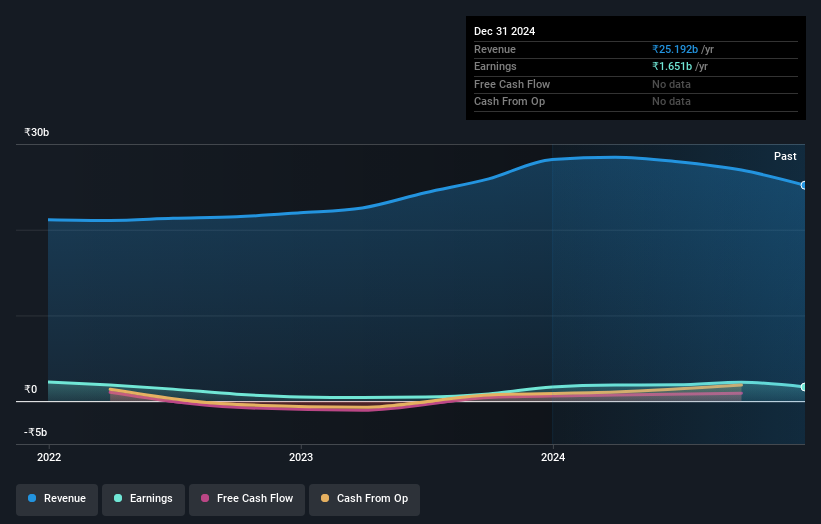- India
- /
- Basic Materials
- /
- NSEI:KCP
The KCP Limited's (NSE:KCP) market cap surged ₹3.5b last week, retail investors who have a lot riding on the company were rewarded
Key Insights
- The considerable ownership by retail investors in KCP indicates that they collectively have a greater say in management and business strategy
- The top 9 shareholders own 50% of the company
- Insiders have bought recently
If you want to know who really controls The KCP Limited (NSE:KCP), then you'll have to look at the makeup of its share registry. We can see that retail investors own the lion's share in the company with 44% ownership. In other words, the group stands to gain the most (or lose the most) from their investment into the company.
As a result, retail investors were the biggest beneficiaries of last week’s 14% gain.
Let's take a closer look to see what the different types of shareholders can tell us about KCP.
View our latest analysis for KCP

What Does The Institutional Ownership Tell Us About KCP?
Many institutions measure their performance against an index that approximates the local market. So they usually pay more attention to companies that are included in major indices.
Less than 5% of KCP is held by institutional investors. This suggests that some funds have the company in their sights, but many have not yet bought shares in it. If the company is growing earnings, that may indicate that it is just beginning to catch the attention of these deep-pocketed investors. We sometimes see a rising share price when a few big institutions want to buy a certain stock at the same time. The history of earnings and revenue, which you can see below, could be helpful in considering if more institutional investors will want the stock. Of course, there are plenty of other factors to consider, too.

We note that hedge funds don't have a meaningful investment in KCP. V Ramakrishna Sons Pvt Ltd is currently the largest shareholder, with 30% of shares outstanding. With 7.9% and 3.3% of the shares outstanding respectively, Velagapudi Lakshmana Dutt and V.R.K. Grandsons Investment Pvt. Ltd are the second and third largest shareholders. Velagapudi Lakshmana Dutt, who is the second-largest shareholder, also happens to hold the title of Co-Chief Executive Officer.
We did some more digging and found that 9 of the top shareholders account for roughly 50% of the register, implying that along with larger shareholders, there are a few smaller shareholders, thereby balancing out each others interests somewhat.
While it makes sense to study institutional ownership data for a company, it also makes sense to study analyst sentiments to know which way the wind is blowing. Our information suggests that there isn't any analyst coverage of the stock, so it is probably little known.
Insider Ownership Of KCP
While the precise definition of an insider can be subjective, almost everyone considers board members to be insiders. Management ultimately answers to the board. However, it is not uncommon for managers to be executive board members, especially if they are a founder or the CEO.
Insider ownership is positive when it signals leadership are thinking like the true owners of the company. However, high insider ownership can also give immense power to a small group within the company. This can be negative in some circumstances.
Our information suggests that insiders maintain a significant holding in The KCP Limited. It has a market capitalization of just ₹28b, and insiders have ₹5.0b worth of shares in their own names. It is great to see insiders so invested in the business. It might be worth checking if those insiders have been buying recently.
General Public Ownership
The general public, who are usually individual investors, hold a 44% stake in KCP. While this group can't necessarily call the shots, it can certainly have a real influence on how the company is run.
Private Company Ownership
It seems that Private Companies own 34%, of the KCP stock. Private companies may be related parties. Sometimes insiders have an interest in a public company through a holding in a private company, rather than in their own capacity as an individual. While it's hard to draw any broad stroke conclusions, it is worth noting as an area for further research.
Next Steps:
While it is well worth considering the different groups that own a company, there are other factors that are even more important. Case in point: We've spotted 1 warning sign for KCP you should be aware of.
Of course this may not be the best stock to buy. So take a peek at this free free list of interesting companies.
NB: Figures in this article are calculated using data from the last twelve months, which refer to the 12-month period ending on the last date of the month the financial statement is dated. This may not be consistent with full year annual report figures.
Valuation is complex, but we're here to simplify it.
Discover if KCP might be undervalued or overvalued with our detailed analysis, featuring fair value estimates, potential risks, dividends, insider trades, and its financial condition.
Access Free AnalysisHave feedback on this article? Concerned about the content? Get in touch with us directly. Alternatively, email editorial-team (at) simplywallst.com.
This article by Simply Wall St is general in nature. We provide commentary based on historical data and analyst forecasts only using an unbiased methodology and our articles are not intended to be financial advice. It does not constitute a recommendation to buy or sell any stock, and does not take account of your objectives, or your financial situation. We aim to bring you long-term focused analysis driven by fundamental data. Note that our analysis may not factor in the latest price-sensitive company announcements or qualitative material. Simply Wall St has no position in any stocks mentioned.
About NSEI:KCP
KCP
Engages in cement, heavy engineering, power generation, and hospitality businesses in India.
Flawless balance sheet with acceptable track record.
Similar Companies
Market Insights
Community Narratives



